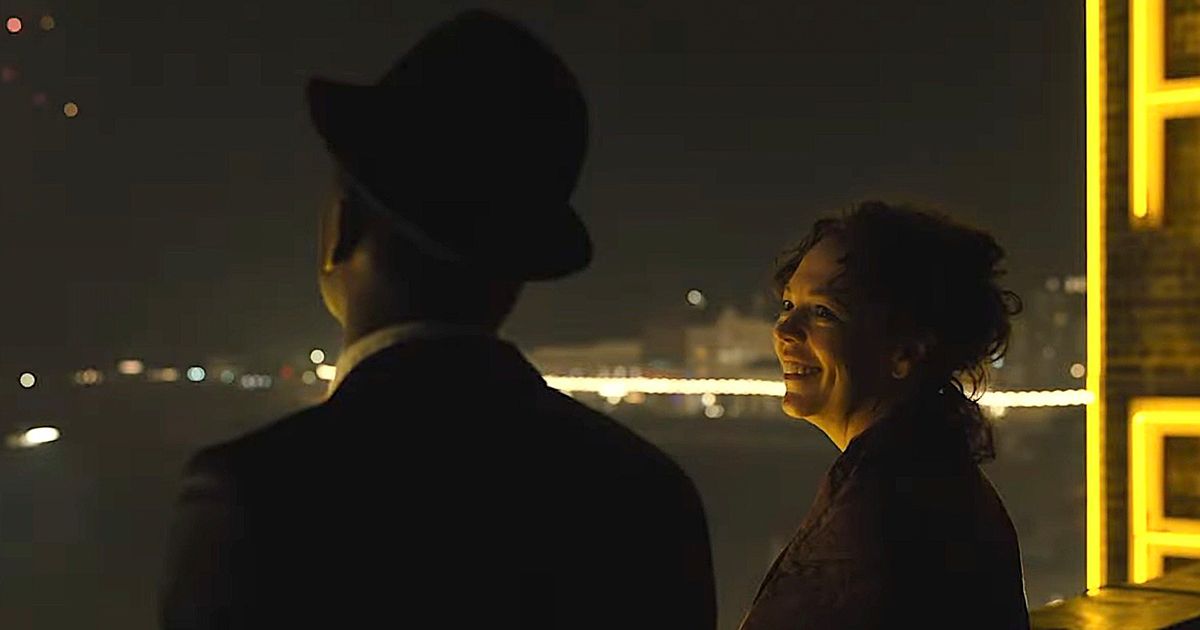The Princess of Wales Theatre was the perfect place for the Canadian premiere of Empire of Light at Toronto International Film Festival 2022. Written and directed by Sam Mendes, Empire of Light harkens to the days of seeing a movie in a theater equipped with plush, red-velvet seats, grand lights, and a marquee. Indeed, the film is Mendes' most autobiographical to date, written during, per his anecdote during the film's Q&A after the premiere screening, the COVID-19-related lockdown in 2020 and inspired by his love of movies in his youth and, more significantly, his mother.
Empire of Light stars Olivia Colman as Hilary Small, the duty manager of the titular Empire theater, who opens the cinema to visitors every morning and oversees front-of-house operations, from counting ticket submissions to serving concessions. It's a simple life, but one that's suited for her, especially after returning from a long leave of work as a result of her struggle with mental health. Her life, both inside the theater and out, effectively changes when Stephen (Micheal Ward), a young Black man, begins working at Empire. Set in 1980s Britain, Mendes' film explores the unique connection Hilary and Stephen form at a time when racism was rampant and mental health less understood.
Empire of Light is essentially a love letter to cinema and features, at its core, a touching and engrossing romance that underscores our inherent need to be understood and our desire for connection. Paired with Roger Deakins' cinematography, with its trademark precision and ability to capture and evoke feeling, and a sweeping piano-based score from Trent Reznor and Atticus, the film is a masterclass from Mendes in crafting a deeply human story against the backdrop of art, one that beautifully depicts our love for movies and, more significantly, that which we mine from them and take with us when the lights come on and we go back to the real world. Reverent and sincere, Empire of Light is the perfect film for and about movie-lovers and -goers alike.
Olivia Colman Absolutely Shines as Hilary Small
Simply put, Colman is a gift to cinema. Though she has stunned in films like The Favourite, The Father, and The Lost Daughter, she is more mesmerizing than ever in Empire of Light. So much so that Variety has reported a likely successful upcoming awards season for the actress. Colman's emotional dexterity is on full-display here, starting off as quiet and subdued (her ever-expressive eyes doing all the talking) before turning in an explosive, yet tender, performance as Hilary's mental state declines. Even through the outbursts, of course, Colman's performance cuts through to the person underneath, demanding compassion and empathy instead of rebuke. Relative newcomer Ward (who shined earlier this year in Lena Waithe's Beauty) more than handles his own as Stephen. He lends the character an earnestness that is instantly charming. At the same time, he possesses a degree of gravitas beyond his years, and thus excels in portraying the darker moments in Stephen's arc. Together, Colman and Ward are fireworks on-screen.
Every Character in Empire of Light Feels Needed
Rounding out the cast are Toby Jones as Norman (the theater's projectionist), Colin Firth as the sleazy manager Mr. Ellis, and Tanya Moodie as Stephen's mother Delia, among others. Moodie, in particular, appears in the film more than halfway through, but no less commands the screen despite her minimal screen time, bringing (without spoiling anything) a mixture of grace and resignation to Delia at a pivotal moment in Stephen's arc. It's a testament to Mendes' script — which is rather ambitious in its incorporation of many timely themes and events — that every character in Empire of Light feels needed, no matter how small or little seen. All of them have heart and help ground the movie in what's most important: connection and community.
Empire of Light ultimately feels like an old-school movie, and it does so without an air of condescension. It's indulgent without being self-righteous. Epic, but not stuffy. It pays tribute to cinema, not as an assertion of tradition in a wildly evolving industry, but rather an opportunity to reminisce and even remember why we watch, write about, and make movies in the first place. The last few films Mendes has done — 1917, Spectre, Skyfall — have been grand spectacles rooted in destruction and humanity at its worst (or, at least, the threat of it). Empire of Light feels just as big, and, for where we are now — particularly as we try to move forward after the last few years, uncertain, damaged, and healing — it's exactly the kind of film we need.


